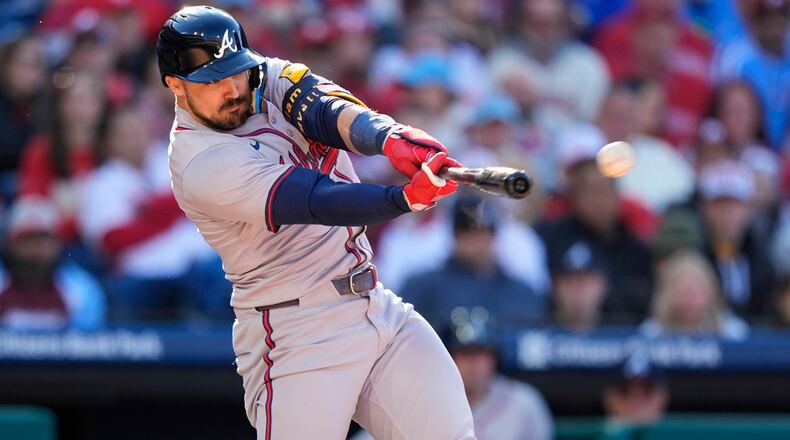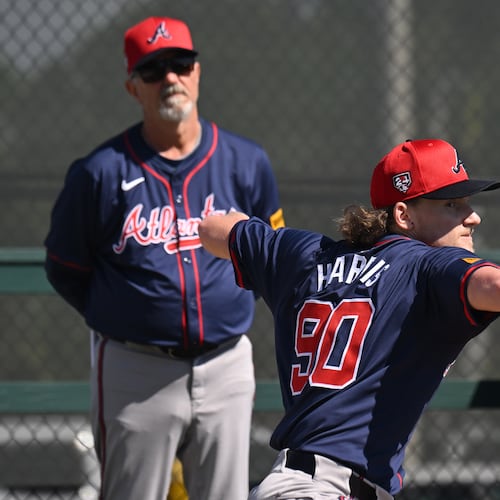MIAMI – In the visiting clubhouse at loanDepot Park on Friday, a reporter stopped Adam Duvall for a story about how he has made the adjustment from everyday player to platoon piece.
“It’s actually funny that you ask that and we’re here, because …” Duvall said.
And then his story begins.
In 2015 when the Reds called him up for the final month of the season, Duvall was not an everyday player. He had to learn how to pinch-hit.
The man who taught him the routine he still uses: Skip Schumaker.
At the time, Schumaker was a veteran utility man on the Reds. Now, he is the Marlins’ manager – the one who guided the club to the postseason last year. And as Duvall said all this, Schumaker was in the opposite clubhouse.
“He was successful at (pinch-hitting) for a long time,” Duvall said.
Pinch-hitting is a notoriously difficult assignment. Last season, MLB hitters combined for a .217 batting average on pinch-hit at-bats. Entering play Sunday, batters had hit .200 as pinch-hitters this year.
As a player, Schumaker hit .244 as a pinch-hitter over his career – a mark that might not seem good, but is above average for the role. In 2015, his 19 pinch-hits led MLB.
And when Duvall was a young pup on the Reds, Schumaker helped him with pinch-hitting. Remember this: MLB players were studs in the minors, meaning they never had to come off the bench down there. Thus, the art of pinch-hitting is often foreign to them when they arrive in the majors, when they might break in as bench players.
“He taught me that, starting about the fourth inning, when (my teammates) go on defense, you come up here into the gym or whatever and you get loose. And then when we’re on offense, you go back into the dugout. And then when we go back out, you come back (in),” Duvall said. “And you kind of stay in the rhythm of the game that way, so that (in) the seventh or eighth or ninth, when you need to be ready to go hit, you’ve already loosened up and you’re already ready to go.”
Asked where he learned this routine, Schumaker first makes something clear.
“First of all, he was a really good player, so I don’t want to take too much credit on that,” he told The Atlanta Journal-Constitution. “You knew he was gonna be a really good player for a long time. (With the way) (how) he took care of his body and the athletic ability, you just knew he was gonna be a really good player in the big leagues for a long time.”
Then he begins telling the story of how he learned to produce as a pinch-hitter.
In 2005 when Schumaker was called up for his debut with the Cardinals, fellow outfielder John Mabry picked him up from the hotel in a taxi. Mabry eventually taught Schumaker how to gameplan.
“When you’re a minor leaguer, you don’t know how to come off the bench,” Schumaker said. “(As a bench player in the majors), the routine is different, in between innings is different, and then you’re facing a back-end guy in leverage situations a lot. And Triple A is much different than the big leagues in the high-leverage situations, right? And then you’re expected to produce in those situations. I didn’t know how to act, and luckily, I had John Mabry kind of teach me how to do it.
“John Mabry was also kind of in the same position as me, so to show you what kind of human he was – I’m coming after his spot, really, right? And that’s what it was. And I always remembered that. Duvall was coming after my spot, in a sense, right? He was the guy that was traded (to the Reds in 2015), kind of a fourth outfielder at the time. But I never forgot that Mabry did that for me. That’s part of being just a good teammate and being part of something bigger than yourself. If you’re trying to really win and it’s not about you, then you try to do everything you can to help teammates.”
Schumaker then said that, because Duvall is such a good person, he’s probably helped younger guys throughout his career – just like Schumaker mentored him. Funny he mentions that: When the Braves signed Duvall to platoon with Jarred Kelenic, Duvall expressed excitement about working with Kelenic, whom the Braves acquired in the offseason.
Duvall has grown because of his experiences in the game, but he seems like the same guy Schumaker met in 2015.
“It was a very quiet confidence,” Schumaker said when asked to describe young Duvall. “He was obviously a really good guy. Well-respected in the clubhouse, even as a young player, because he worked. You earn respect as a young player by how you go about your business, and that’s why he’s still been around the league for a long time and (been) a very successful major leaguer, because of the amount of work he put in.”
And the best part: “Best hair in the game. That hasn’t changed.”
A couple weeks into this season, Duvall’s role is exactly as envisioned: He starts against left-handed starters. On Sunday, he was in the starting lineup for the sixth time in 14 games.
His situation, in a way, mirrors what he did when he came into the majors. No, he’s not always a pinch-hitter – he’s only done that once this season – but he’s still staying in the rhythm of the game when he isn’t in the lineup. He might have to come in at any moment.
And when that fourth inning rolls around, he begins preparing his body. It isn’t so much about the cage work that early in the game.
“I don’t want to be swinging for five innings straight,” he said. “It’s more so getting my body loose, getting my body ready because it all happens so fast. It’s, ‘Hey, he’s bringing a lefty in, you’re gonna hit in the second spot. It’s like, ‘Okay.’ You gotta be well prepared and already ready before they come to you and tell you that you’re gonna hit, because it just takes time to get your body fully loose and ready to go into a Major League Baseball game.”
Pinch-hitting itself is so difficult because a batter must come into the game “cold” – he might’ve warmed up, but he wasn’t already in the game. Facing what’s likely a good arm, a player must put together a good at-bat without the prior experience of two at-bats before that.
“It’s preparation, number one. You’re not gonna go up there naked, right? You have to know who you’re facing, how they attack and then prepare in the cage for that attack,” Schumaker said. “And that’s what (Duvall) was really good at, is preparing for the attack, because he knew he studied the pitcher that he was about to face.”
The Braves planned on giving Kelenic everyday at-bats, but that changed when they realized they could sign Duvall for $3 million. Still a productive hitter and terrific clubhouse guy, Duvall made their team better.
And even if he couldn’t play every day, he still wanted to be back in Atlanta.
“I think there’s a couple things that are very important to me at this point in my career, and one of those is winning,” Duvall said. “I want to be on a winner and I want to be on a playoff contender and a World Series contender. I felt like I was getting that here, so that’s why I was excited to come back.”
About the Author
Keep Reading
The Latest
Featured



